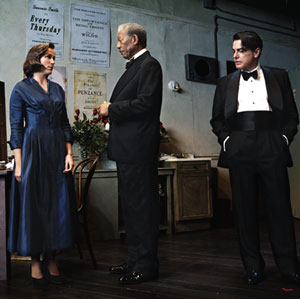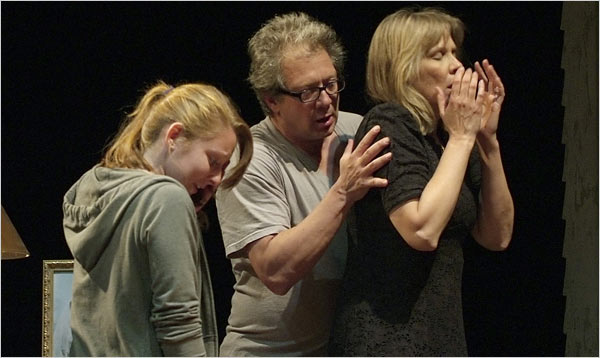“I come to the conclusion that it is a mistake to try to write highly ‘poetical’ and ‘literary’ librettos. The poet ought to concentrate entirely on drama and absolute truth to human nature, however unreal or fantastic the story may be; and always to use the very simplest words which everybody can understand at first hearing. Secondly, always to make the characters talk in their own character, and to avoid carefully all temptation to put the author’s own private philosophy of life into their mouths. This if properly carried out does not at all prevent the poet’s own personality coming through the whole drama, as the great dramatists of the past have shown us. Prospero for instance talks of a good deal of ‘philosophy’ but it is all within the character of Prospero himself.”
Edward J. Dent, letter to Bernard Stevens (June 12, 1950)
TT: Bright stars, dim casting
Broadway has entered the home stretch of the 2007-08 season, and opening nights are coming fast and furious. I review three new shows in today’s Wall Street Journal column, The Country Girl, Les Liaisons Dangereuses, and Thurgood. All, alas, proved to be disappointments. Here’s an excerpt.
* * *
 Two of America’s best actors opened on Broadway this week in a pair of plays that don’t suit their talents. Such disappointments are a necessary part of the career of every serious artist who is brave enough to take chances, but some chances are better than others, and I wish that Morgan Freeman and Laura Linney had chosen more suitable vehicles for their long-awaited returns to the New York stage.
Two of America’s best actors opened on Broadway this week in a pair of plays that don’t suit their talents. Such disappointments are a necessary part of the career of every serious artist who is brave enough to take chances, but some chances are better than others, and I wish that Morgan Freeman and Laura Linney had chosen more suitable vehicles for their long-awaited returns to the New York stage.
Mr. Freeman, who hasn’t set foot on any stage in two decades, is starring in Mike Nichols’ revival of “The Country Girl,” one of the last plays by Clifford Odets to do well on Broadway. Written in 1950 and most recently revived there 36 years ago, it’s best known in George Seaton’s 1954 film version, which won Grace Kelly an Oscar, though it was Bing Crosby who gave the more interesting performance. Like Crosby, Mr. Freeman is playing the part of Frank Elgin, an over-the-hill actor-alcoholic who has been given one last chance to redeem himself. It’s a challenging role: Elgin starts off scared and ingratiating, then goes on a bender, at last pulling himself together and becoming the man he used to be. The trouble is that Elgin is a weak man, and weakness is not one of the more interesting colors in Mr. Freeman’s palette. Once Elgin recovers his courage in the second act, Mr. Freeman snaps into focus and starts making sense, but until then you never quite believe him….
Laura Linney has the twin gifts of simplicity and sincerity: It is impossible to doubt anything she says, whether on screen or onstage. Hence it is hard to see why she would have wanted to play the Marquise de Merteuil, the elaborately deceitful anti-heroine of “Les Liaisons Dangereuses,” Christopher Hampton’s “Masterpiece Theatre”-style stage version of Choderlos de Laclos’ 1782 epistolary novel about a pair of aristocratic immoralists who make the fatal mistake of putting their heads in a noose of their own knotting. Ms. Linney, doubtless to her credit, lacks the sharp, supercilious edge of hypocrisy without which the Marquise cannot be portrayed convincingly, and though she does all she can to simulate it, the results too often suggest a very, very smart young girl playing dress-up….
Thurgood Marshall was by all accounts a peerless raconteur, full to overflowing of blunt, salty tales about the troubles he’d seen. George Stevens, Jr.’s “Thurgood,” in which Laurence Fishburne plays the man who argued Brown v. Board of Education before the U.S. Supreme Court, then became its first black justice, shows us that side of him–and nothing more. Like most one-man shows about historical figures, it’s a shallow exercise in hagiography: Mr. Stevens’ script turns Marshall into a smug, self-satisfied storyteller whom we are invited to admire, and the fact that he did so many admirable things does not make this one-dimensional portrait any more credible, much less dramatic….
* * *
Read the whole thing here.
TT: Almanac
“This was a time in which you were always meeting people who caught politics just as a person catches religion. It was probably the last time in this century when politics in our country will be evangelical, and if a man was once intensely religious, he was bound to be wide open to a mood like that of the Thirties. But why waste time explaining the pattern? It is obvious now, and dozens of books have been written about it. Less obvious have been some of the attendant passions that went along with this neo-religious faith. Passion has a way of spilling over into all aspects of the human mind and feelings. It is the most dangeorus thing in the world whether it focuses itself on love, religion, reform, politics or art. Without it the world would die of dry rot. But though it creates it also destroys. Having seldom been its victim I have only pity for those who are, and I would be a hypocrite if I judged them by the standards you can safely apply to a man at peace with himself and his circumstances.”
Hugh MacLennan, The Watch That Ends the Night
CAAF: Morning coffee
• At MetaxuCafé, a cadre of great contributors are providing ongoing coverage of the PEN World Voices Festival, which continues through Sunday.
• A short film inspired by Leonora Carrington’s “The Debutante.” In a very modern piece of addenda, there’s a note from one of Carrington’s grandsons in the comments. Like the Mansfield and Keogh stories I linked to Tuesday, “The Debutante” is another very, very short story about what it’s like to be a young girl, though it’s the only one of the three to feature a hyena. I smell a bit strong, eh?
If you’re not familiar with Carrington, you can start with this profile; and I wrote a little about her amazing novel, The Hearing Trumpet here.
• His novel is still two weeks from publication, and my James Frey fatigue has already set in.
TT: I’ll call you
Note the time stamp on this posting. I got back from my trip to Santa Fe (about which much, much more later) ten minutes ago, and I slept roughly three hours out of the past forty-eight.
I’m turning off my computer and phone for the next eight hours. Or twelve.
TT: So you want to see a show?
Here’s my list of recommended Broadway, off-Broadway, and out-of-town shows, updated weekly. In all cases, I gave these shows favorable reviews (if sometimes qualifiedly so) in The Wall Street Journal when they opened. For more information, click on the title.
Warning: Broadway shows marked with an asterisk were sold out, or nearly so, last week.
BROADWAY:
• Alfred Hitchcock’s The 39 Steps (comedy, G, suitable for bright children, reopened Tuesday, reviewed here)
 • August: Osage County (drama, R, adult subject matter, reopened Tuesday, reviewed here)
• August: Osage County (drama, R, adult subject matter, reopened Tuesday, reviewed here)
• Avenue Q (musical, R, adult subject matter and one show-stopping scene of puppet-on-puppet sex, reviewed here)
• A Chorus Line * (musical, PG-13/R, adult subject matter, reviewed here)
• Cry-Baby * (musical, PG-13, mildly naughty and very cynical, reviewed here)
• Grease * (musical, PG-13, some sexual content, reviewed here)
• Gypsy * (musical, PG-13, adult subject matter, reviewed here)
• In the Heights (musical, PG-13, some sexual content, reviewed here)
• The Little Mermaid * (musical, G, entirely suitable for children, reviewed here)
• Macbeth * (drama, PG-13, unsuitable for children, closes May 24, reviewed here)
• November (comedy, PG-13, profusely spattered with obscene language, reviewed here)
• Passing Strange (musical, PG-13, adult subject matter, reviewed here)
• South Pacific * (musical, G/PG-13, some sexual content, brilliantly staged but unsuitable for viewers acutely allergic to preachiness, reviewed here)
• Sunday in the Park with George * (musical, PG-13, too complicated for children, closes June 29, reviewed here)
OFF BROADWAY:
• Adding Machine (musical, PG-13, adult subject matter, too musically demanding for youngsters, extended through Aug. 31, reviewed here)
• The Four of Us (comedy, PG-13, adult subject matter, extended through May 18, reviewed here)
• From Up Here (drama, PG-13, closes June 8, reviewed here)
IN MILLBURN, N.J.:
• Kiss Me, Kate (musical, PG-13, far too sophisticated for children, close May 18, reviewed here)
ON TOUR:
• Moby-Dick–Rehearsed (drama, G, not suitable for children, touring the U.S. through May 17, reviewed here)
TT: Almanac
“Oh, pity every man who comes hard to the knowledge that underneath his bright, sure consciousness he is not himself but Everyman.
“Fate, I thought. Who is equal to it? For to be equal to fate is to be equal to the knowledge that everything we have achieved, endured and been proud and ashamed of is nothing.”
Hugh MacLennan, The Watch That Ends the Night
TT: The envelope, please
 At this hour I’m in Santa Fe, New Mexico, where Paul Moravec and I are joining with Richard Gaddes, the general director of the Santa Fe Opera, and Charles MacKay, who will be succeeding Gaddes in October, to announce the details of the company’s 2009 premiere of The Letter at a press conference.
At this hour I’m in Santa Fe, New Mexico, where Paul Moravec and I are joining with Richard Gaddes, the general director of the Santa Fe Opera, and Charles MacKay, who will be succeeding Gaddes in October, to announce the details of the company’s 2009 premiere of The Letter at a press conference.
This is the press release describing the opera and its cast and production team.
* * *
THE LETTER
Composer: Paul Moravec
Librettist: Terry Teachout
Sung in English
World Premiere
Commissioned by The Santa Fe Opera
July 25, 29, August 3, 7, 15, 18
Conductor: Patrick Summers
Director: Jonathan Kent
Scenic Designer: Hildegard Bechtler
Costume Designer: Tom Ford
Patricia Racette Leslie Crosbie
Anthony Michaels-Moore Robert Crosbie
James Maddalena Howard Joyce
Roger Honeywell Geoff Hammond
Ning Liang Chinese Woman
Rodell Rosel Ong Chi Seng
Keith Jameson John Withers
The Letter is based on W. Somerset Maugham’s 1927 stage adaptation of one of his best-known short stories. It has been filmed twice, the second time in 1940 in an Oscar-nominated version starring Bette Davis and directed by William Wyler. Paul Moravec, the composer, won the 2004 Pulitzer Prize for Music for Tempest Fantasy and is currently Artist-in-Residence at the Institute for Advanced Study in Princeton and University Professor at Adelphi University. Terry Teachout, the librettist, is the drama critic of The Wall Street Journal and the author of a forthcoming biography of Louis Armstrong. The opera is ninety minutes long.
“The Letter is an opera noir, a story of ordinary people who make a few mistakes and suddenly find themselves swept into very deep emotional water, way over their heads,” says Moravec. “It combines the aesthetic of American verismo with dream-like qualities often characteristic of a psychological drama. We intend it to be as fast-moving and hard-hitting as a Hollywood film noir from the ’40s.”
“Our goal,” says Teachout, “has been to write a work that’s firmly rooted in traditional operatic practice–one that will make dramatic sense to mainstream audiences.”
Patricia Racette and Anthony Michaels-Moore star as Leslie and Robert Crosbie, an unhappily married expatriate couple whose life in the jungle of Malaya is torn apart by passion, violence, and revenge. Racette appeared most recently in the 2005 Turandot. Michaels-Moore will be singing the title role in this year’s Falstaff. Other members of the cast include Roger Honeywell, last seen in the 2007 production of Tea: A Mirror of Soul, and James Maddalena, Ning Liang, and Rodell Rosel, all making their company debuts. Patrick Summers, music director of the Houston Grand Opera, also in his company debut, will conduct.
The production will be directed by Jonathan Kent, who staged the critically acclaimed Broadway revival of Brian Friel’s Faith Healer in 2006. Kent has directed three operas in Santa Fe, most recently Thomas Adès’ The Tempest in 2006. He is staging the 2008 Marriage of Figaro. Hildegard Bechtler, the set designer, created the set for Primo, Anthony Sher’s stage version of Primo Levi’s If This Is a Man, which played on Broadway in 2005. Tom Ford, the award-winning New York fashion designer, will design the costumes. One of the nation’s best-known fashion figures, his oeuvre includes men’s clothing, perfume and accessories. A longtime Santa Fean, Ford graduated from Santa Fe Prep and keeps a home here.
* * *
Opera buffs will need no further introduction to the stars of The Letter, but for those of you who don’t follow the business that closely, suffice it to say that Patricia Racette and Anthony Michaels-Moore starred in the Metropolitan Opera’s new production of Benjamin Britten’s Peter Grimes, which opened earlier this year, while James Maddalena is best known for having created the role of Richard Nixon in John Adams’ Nixon in China. As for Jonathan Kent, Hildegard Bechtler, Tom Ford, and Patrick Summers, I think the press release speaks quite well for itself.
I’ll fill you in after I get back to New York tonight, but for the moment I doubt I need to say much more than that Paul and I are honored–actually, “staggered” might be a better word–to have our very first opera produced and performed by such an illustrious group of collaborators. (I’ve written about Pat, Jonathan, and Hildegard in my capacity as a critic, so my admiration for their work is a matter of record.) It isn’t often that you get to start at the top, but that’s what’s happened to us, and we don’t need to be told what that means.
Now, if you’ll excuse me, I have to catch a plane. Broadway is calling!
